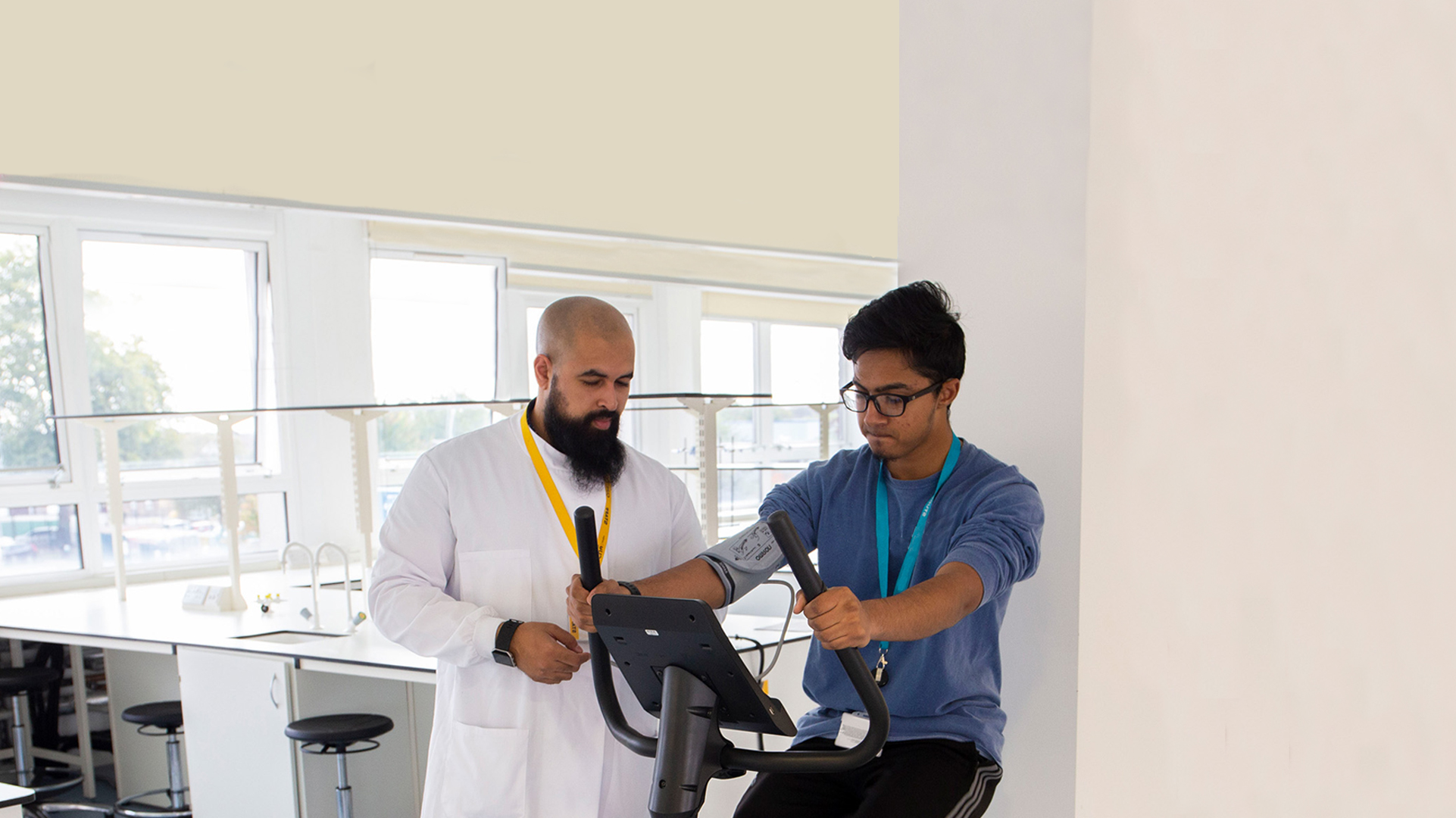Search
Public Health and Community Studies BA (Hons)
Study level: UndergraduateHNC/HND courses

Public health is considered the science and art of promoting and protecting health and wellbeing, preventing ill-health and prolonging life through the organised efforts of society.
Course features
Course option
Year of entry
Location
CU London (Dagenham, London)
Study mode
Full-time
Sandwich
Duration
4 years sandwich
3 year - Degree
2 year - HND
1 year - HNC
UCAS codes
LL45
5KLL
54LL
Start date
January 2026
March 2026
May 2026
June 2026
Course overview
The Public Health and Community Studies BA (Hons) course aims to provide you with the underpinning theoretical knowledge, professional expertise and work-based learning relevant to work within public health, and healthcare initiatives at the local, national and international levels.
Throughout the course, you will address health inequalities, as well as analyse government initiatives. You can expect to explore how social factors and institutions are constructed and represented, and their implications on everyday life. You’ll explore the skills, behaviours and techniques of effective management and the role of leadership in relation to business themes. Additionally, you can expect to develop your skills in decision-making and information management.
Why you should study this course
You should study this course if you want:
- visits, activities and collaborations that expose you to a variety of local services and community projects, with support to access voluntary placements if desired2
- opportunities for learning outside the classroom and an approach to teaching that includes applying your learning
- a diverse and contemporary curriculum that covers a wide range of public health services and community projects, with the potential to lead to local employability options
- a diverse team of experienced tutors with backgrounds in health care, social care, public health and community work.
I was thrilled with the mode of teaching at CU London. The lectures made complex concepts accessible, emphasising that if you can't explain what you've learned to a young child, then you haven't truly understood it. This practical, hands-on approach really resonated with me. They also went above and beyond, offering their support even outside of lecture hours, so I felt very at ease.
Elvis Chiaghanam, Public Health and Community Studies BA (Hons) graduate, quoted October 2024 (on left of picture)

What you'll study
We regularly review our course content, to make it relevant and current for the benefit of our students. For these reasons, course modules may be updated.
This course has given me an opportunity to be able to practise what I've been taught within the classroom, being able to speak to people. Of course, because it's a public health course, you are going to be speaking to the public. So, you're supposed to be educating people as to what you represent and what you need them to know. It's been a beautiful experience.
Oluwajuwon Okanrende, Public Health and Community Studies BA (Hons) student, quoted in 2025

How you'll learn
This course is available as a full-time three-year or optional four-year sandwich course, the latter incorporating a work placement or study year in a related field2.
Our teaching methods are varied, so in addition to lectures, we also utilise a blended learning approach, including online aspects, workshops and group work. We also operate an open-door policy, with additional availability via email and our online learning platform, Aula.
Progression through the modules develops knowledge and skills, including communication (written and oral), study skills, research methods, project management, presentation and career development. We will also encourage you to consider your employability and/or entrepreneurial development.
Unlike traditional institutions, there are no-end-of year exams. Instead, learning is assessed through coursework and phase tests, which is more reflective of our learning model.
Teaching contact hours
As a full-time undergraduate student, you will study modules totalling 120 credits each academic year. A typical 20 credit module requires a total of 200 hours study. This is made up of teaching contact hours, guided and independent study.
Teaching hours
Teaching hours vary each semester, year of study and due to module selection. During your first year you can expect 15-18 teaching hours each week. You will also have the option to attend optional sessions including time with a progress coach or to meet with staff for advice and feedback. As you progress through your studies, teaching hours may reduce.
Guided and independent study
Throughout your studies, you will be expected to spend time in guided and independent study to make up the required study hours per module. You'll be digging deeper into topics, review what you've learned and complete assignments. This can be completed around your personal commitments. As you progress through your studies, you'll spend more time in independent study.
Online learning
As an innovative university, we use different teaching methods including online tools and emerging technologies. So, some of your teaching hours and assessments may be delivered online.
Assessment
The learning outcomes of modules, assignments and projects will be clearly stated. Your work will be marked according to how well you achieve these learning outcomes and your final feedback will refer to each outcome, as well as providing an overall percentage grade.
Assessment methods vary and may include practical class and project performance, written practical reports, project thesis, oral presentations, tutorial tasks and assessments.
Breakdown of final grade assessment (subject to change):
- coursework
- assessments.
The Coventry University Group assessment strategy ensures that our courses are fairly assessed and allows us to monitor student progression towards achieving the intended learning outcomes.
International experience opportunities
Students may have the opportunity to engage with Collaborative Online International Learning (COIL) projects, including online seminars, lectures, and network with students and course leaders in universities across the world2. COIL projects may also be with charities.
Please note that all international experience opportunities may be subject to additional costs, competitive application, availability and meeting applicable visa and travel requirements are therefore not guaranteed2.
Entry requirements
Typical entry requirements:
Fees and funding
| Student | Full-time | Part-time |
|---|---|---|
| UK, Ireland*, Channel Islands or Isle of Man | £9,535 per year | Not available |
| EU | £9,535 per year with EU Support Bursary** £14,800 per year without EU Support Bursary** |
Not available |
| International | £14,800 per year | Not available |
If you choose to study this course with a professional placement2 or study abroad year, you will need to pay a tuition fee3 to cover your academic support throughout your placement year. Students commencing their professional placement in the academic year 2027/28 will pay £1,500 if they are paying UK fees, or £1,800 if they are paying international fees.
For advice and guidance on tuition fees and student loans visit our undergraduate finance page and see the university’s Tuition Fee and Refund Terms and Conditions.
The University will charge the tuition fees that are stated in the above table for the first Academic Year of study. The University will review tuition fees each year. For UK (home) students, if Parliament permits an increase in tuition fees, the university may increase fees for each subsequent year of study in line with any such changes. Note that any increase is expected to be in line with inflation.
If you choose to study this course with a professional placement, the University will charge the tuition fees stated above for those on a placement during Academic Year 2027/28. The University will review professional placement tuition fees each year. For UK (home) students, the University may increase fees for each subsequent year of study, but such that it will be no more than 5% above inflation.
For international students, we may increase fees each year, but such increases will be no more than 5% above inflation. If you defer your course start date or have to extend your studies beyond the normal duration of the course (e.g. to repeat a year or resit examinations) the University reserves the right to charge you fees at a higher rate and/or in accordance with any legislative changes during the additional period of study.
We offer a range of international scholarships to students all over the world. For more information, visit our international scholarships page.
Tuition fees cover the cost of your teaching, assessments, facilities and support services. There may be additional costs not covered by this fee such as accommodation and living costs, recommended reading books, stationery, printing and re-assessments should you need them.
The following are additional costs not included in the tuition fees:
- Any optional overseas field trips or visits: £400+ per trip.
- Any costs associated with securing, attending or completing a placement (whether in the UK or abroad).
*Irish student fees
The rights of Irish residents to study in the UK are preserved under the Common Travel Area arrangement. If you are an Irish student and meet the residency criteria, you can study in England, pay the same level of tuition fees as English students and utilise the Tuition Fee Loan.
**EU Support Bursary
Following the UK's exit from the European Union, we are offering financial support to all eligible EU students who wish to study an undergraduate or a postgraduate degree with us full-time. This bursary will be used to offset the cost of your tuition fees to bring them in line with that of UK students. Students studying a degree with a foundation year with us are not eligible for the bursary.
Facilities
CU London Dagenham campus is in the Civic Centre building and is easily accessible by road, bus and rail. Facilities include:
- classrooms with interactive teaching capabilities
- comprehensive library and learning services
- study areas, laptops/open-access computers and social spaces
- student support and careers advice teams.
Facilities are subject to availability. Access to some facilities (including some teaching and learning spaces) may vary from those advertised and/or may have reduced availability or restrictions where the university is following public authority guidance, decisions or orders.
Careers and opportunities
With a growing demand for skilled health professionals, graduates of the Public Health and Community Studies BA (Hons) degree have an expansive list of career paths to explore. On successful completion, you will be able to:
- demonstrate understanding and knowledge of the theoretical, analytical and practical aspects of legislation, strategies and policies within a changing environment, to meet stakeholder interests
- critically appraise theories related to the development of a health promotion strategy, considering social determinants that could influence the effectiveness
- develop appropriate research and analysis techniques, alongside the ability to undertake reliable market research activities
- operate, lead and collaborate in a team to solve problems of a practical (experimental) nature and to provide appropriate solutions
- apply appropriate presentation and evaluation tools to establish the significance of research data produced.
While the majority of graduates go directly into a public health profession, others have chosen to study further in the field, with several students undertaking a master’s degree in subjects such as Public Health and Nutrition, International Business Management and Social Policy.
Where our graduates work
There are a variety of career paths you could choose to take after completing this degree. Graduates have gone on to work successfully in following careers:
- Briefing Advisor (higher executive officer) with the parliamentary and public accountability team within UKHSA
- Digital Care Coordinator for Primary Care network
- Independence Advisor
- Programme Leader, FE
- Addiction Support Worker
- Community Support Officer for local authority
- Health Intervention Officer for HM Prison Services
- Mental Health Link Worker
- Social Prescribing Worker









